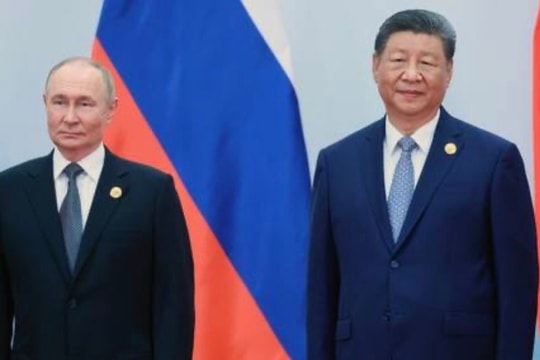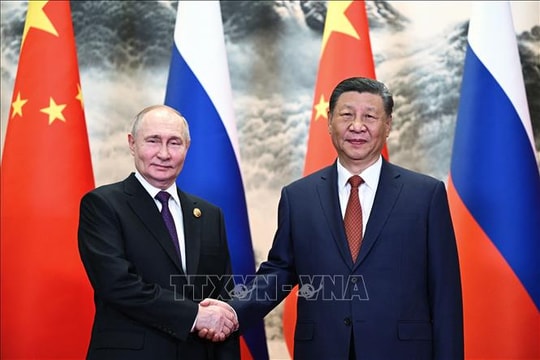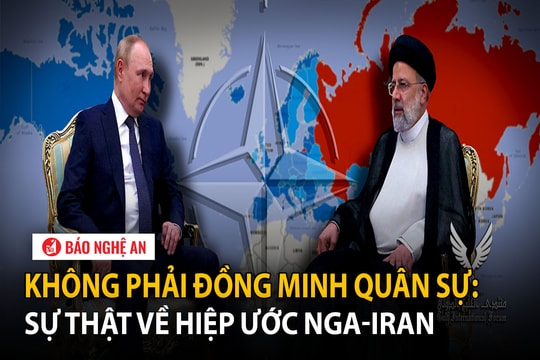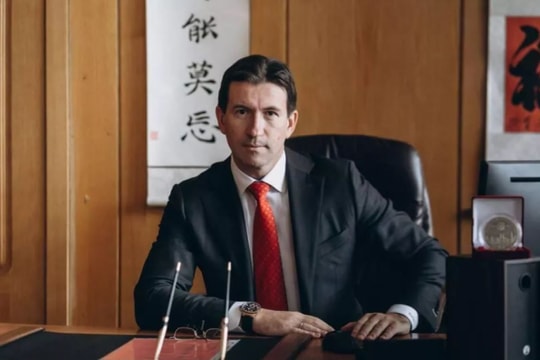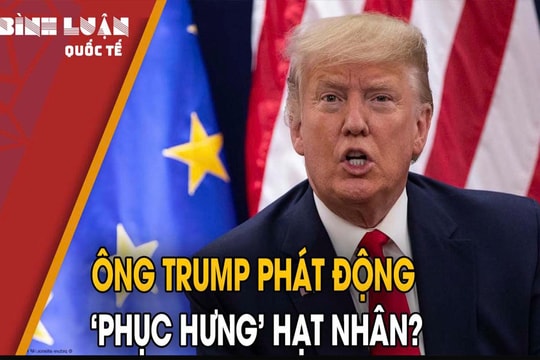China - Russia 'sublimated' thanks to the US?
(Baonghean) - On June 5, Chinese President Xi Jinping began his official visit to the Russian Federation. The visit took place as the two countries prepared to celebrate the 70th anniversary of the establishment of bilateral diplomatic relations.
This visit by the head of the Chinese party and state not only strengthens relations but, as observers assess, these are two partners who “have the same disease and the same fate”. China and Russia will also work together to find solutions to deal with their top rival, the US, which is having problems and tensions with both Moscow and Beijing.
Joint interests
“The Chinese and Russian economies are complementary, and the US-China trade war is pushing Moscow and Beijing closer together.”…This is what public opinion is saying about the Russia-China relationship as well as the purpose of Chinese President Xi Jinping's visit to Russia this time.
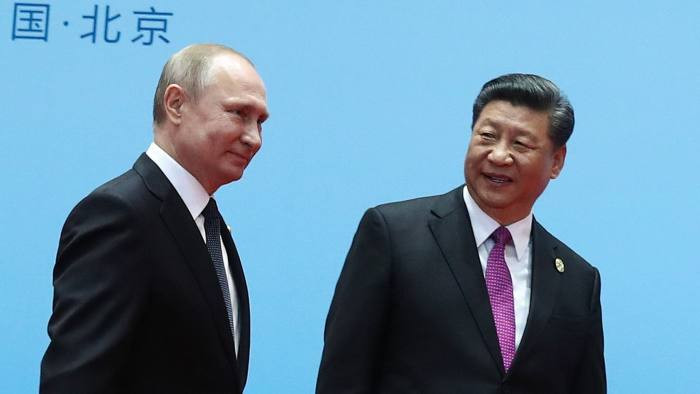 |
| Russian President Vladimir Putin and Chinese President Xi Jinping. Photo: AFP |
Since 2013, the two leaders of Russia and China have had 28 meetings, the latest being at the end of April when President Putin attended the “Belt and Road” forum in Beijing. During the meetings, both sides did not hesitate to affirm that the relationship between the two sides is at its best stage in the history of bilateral relations. The Chinese press also emphasized that after 70 years of establishing diplomatic relations, the two sides have reached the highest level of trust, the highest level of cooperation and the highest strategic value ever!
It is not difficult to explain the rapid steps to tighten relations between Russia and China. On the Russian side, since 2014 when Crimea was annexed by Russia, relations between Russia and the West have fallen to their lowest level since the Cold War. Since then, Russia has been continuously subjected to sanctions and embargoes by the US and its European allies. Although recently, European countries, due to disagreements over interests with the US, have taken a more relaxed stance and even left open the possibility of cooperation with Russia, the sanctions have not been completely lifted.
In such a “pressured” context, Russia’s choice of other potential partners, typically China, is perhaps an inevitable move. Not only diversifying its partners to promote cooperation and economic development, Russia also seeks China’s geostrategic support in the Arctic dossier that is heating up day by day, as well as strengthening its voice and position in regional and world hotspots such as North Korea, Iran or Venezuela…
On China’s side, of course, the incalculable damage from the increasingly tense trade war with the US is a strong motivation for Beijing to get closer to Moscow than ever before. For example, in the agricultural sector, while in the past China mainly imported agricultural products from the US and Canada, it is now expected to expand to new partners.
China, the world’s largest soybean importer, is said to have stopped buying the product from the US due to trade war tensions. This move will obviously bring great opportunities for Russia but also a warning to the US.
According to economic journals, soybean prices in the US have fallen sharply, significantly affecting American farmers. Meanwhile, energy - specifically gas - is also one of the potential areas where the two sides can cooperate. With one side being a large supplier that is looking for an outlet for energy like Russia and the other side having a huge demand for oil and gas to serve its huge domestic needs like China, the China - Russia handshake is like "a fish in water" in the current context!
Partner or ally?
With the extremely good foundations that have been established in the past, plus the objective context that has pushed the two sides closer together, Chinese President Xi Jinping's visit to Russia this time is expected to be filled with an atmosphere of positive cooperation and development.
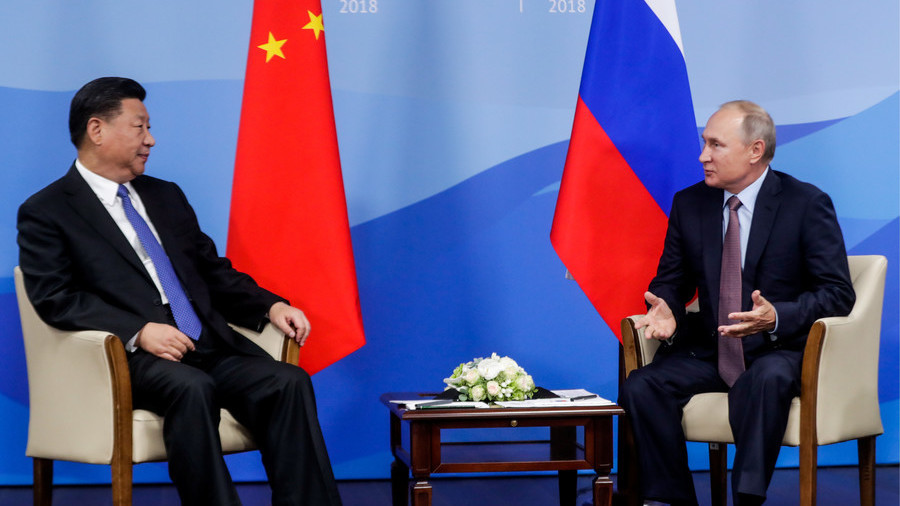 |
| Russian President Vladimir Putin and Chinese President Xi Jinping at the Eastern Economic Forum in Vladivostok, Russia in September 2018. Photo: Reuters |
It is expected that the two sides will sign 30 cooperation agreements during this visit, notably including a statement on a comprehensive plan for joint development and cooperation between the two countries and a document on issues related to international strategic stability.
Other agreements will cover a range of issues including trade, energy and investment. These will be a great stepping stone for trade cooperation between the two countries, which increased by 24.5% to 108 billion USD last year. Russia has also become China's largest energy supplier. In addition, the two leaders will enjoy a gala concert on friendship between the two countries; the Chinese president will also attend the 23rd International Economic Forum in St. Petersburg.
Chinese Ambassador to Russia Li Hui also recently emphasized the great potential for cooperation between the two sides such as energy, space, infrastructure, agriculture, trade or the framework of the Asian Infrastructure Investment Bank and the Silk Road Fund...
However, public opinion is questioning whether Russia and China, both permanent members of the United Nations Security Council and with overlapping interests on a series of issues, can go beyond being partners to become strategic allies?
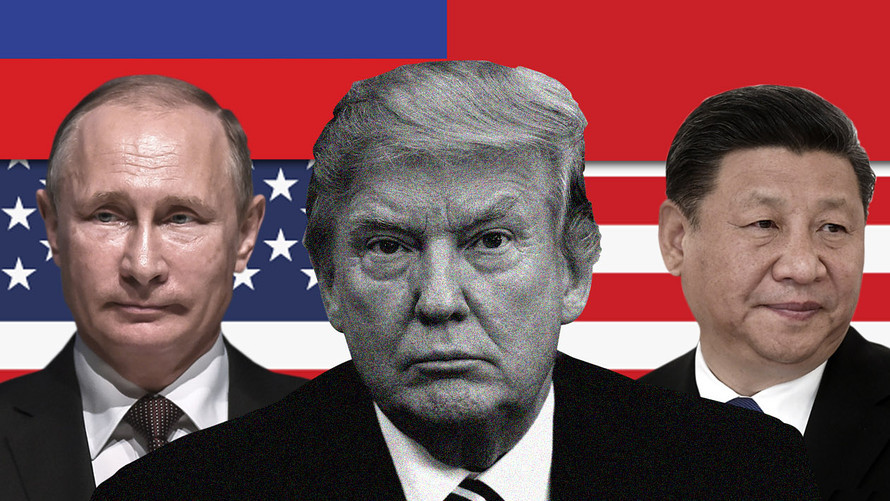 |
| The US is unintentionally pushing Russia and China closer together. Photo: Getty |
First of all, it is necessary to affirm the fact that the main link between the two countries today is the confrontation with the US on different fronts. For Russia and the US, it is the tension in the Crimea, Syria or the Middle East issue, while for China and the US, it is the competition for geostrategic position in Asia and the trade war between the two sides. This also means that the relationship between the two sides will most likely be "less warm" if the tension with the US is reduced. Besides, although they complement each other greatly in terms of economy and trade, the second largest economy in the world, China, and an economy that has not yet reached the Top 10 in the world, like Russia, also have significant differences in terms of size, population, and military.
Not to mention, currently, although China and Russia have not made clear statements, they have implicitly determined that Russia will not hinder the expansion of influence in Asia and China will not make any moves that negatively affect Russia's position in the Middle East or Europe. However, no one can answer whether these fragile boundaries are sustainable or will be severed at any time? Therefore, some experts have commented that the Russia-China relationship may be a close partnership for short-term strategic benefits, but in the long term, it is difficult to form a close alliance. This will certainly also be the red thread governing Chinese President Xi Jinping's visit to Russia this time.

